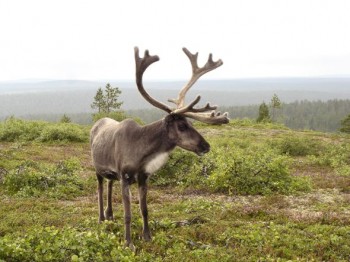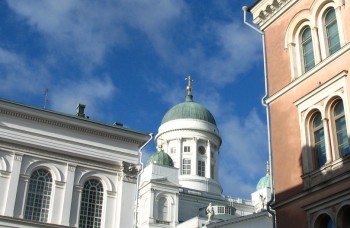Search results for "herbert lomas"
From the land of abundant reindeer…
17 March 2011 | This 'n' that

Rangifer tarandus, Finnish Lapland. Photo: Grand-duc (http://en.wikipedia.org/wiki/User:Grand-Duc)
Is Finland, a land of reindeer, ‘dense pine forests and deep snows’ also a ‘quiet literary landscape’?
Not exactly, as we at Books from Finland hope we are demonstrating. And over on the Bookslut website, Bonnie B. Lee comes to the same conclusion, after having mused about the reindeer (yes: in Helsinki you find tasty chunks of them in the freezer boxes of any foodstore) and reading three Finnish novels in English translation.
The novels Lee reviews are Purge by Sofi Oksanen (Puhdistus, 2008, translated by Lola Rogers, published last year), When I forgot by Elina Hirvonen (Että hän muistaisi saman, 2005, translated by Douglas Robinson, published in 2009) and The Year of the Hare by Arto Paasilinna (Jäniksen vuosi, 1975, first published in an English translation by Herbert Lomas in 1995, reprinted as a Penguin edition last year).
We have just entered the Year of the Rabbit, in recognition of which Paasilinna’s book (about a man who rejects his old life and goes roaming the wildernesses with a hare as his only companion) has appeared on the tables of large bookstores in the US. ‘The Year of the Hare is only the most Finnish, and perhaps most antically Zen-ish, of a shelf-load of books that tell us to find and live by our own ideas of contentment,’ said The Wall Street Journal.
The traumatic experiences of war and Finland’s deep forests are the common feature of these novels, Bonnie B. Lee finds. She also opines that ‘melancholy pervades the Finnish psyche’, and that ‘Finland vies with Hungary for highest suicide rate in Europe‘. Oh, but this latter is no longer true: number one on a World Health Organisation suicide rates list is Lithuania, followed by Hungary, Slovenia, Estonia and Latvia – Finland is number six.
Lee is clearly intrigued by her travels in contemporary Finnish literature. ‘The search for identity, a reckoning with a troubled past, and an outsider’s view looking in,’ she comments, ‘are all the stuff of great writing, and Finland is poised to continue to produce poignant and introspective literature that we can appreciate now that English translators have begun the work.’
Poignant and introspective or occasionally funny and fantastical, this is the work we try to offer an early glimpse of, in translation, at Books from Finland. Stay with us!
How to win literary prizes
30 September 1991 | Archives online, Fiction, Prose
A short story from Terveessä ruumiissa (‘In a healthy body’, Gummerus, 1990)
Later, as he mulled over the moments just before it all happened – with himself delivering his appreciative peroration to the prizewinner in the front row – the Chairman of the Prize Committee could recall no warning sign. Antti was tense, of course, but, considering his artistic sensitivity and the hundred-strong audience, there was nothing abnormal about that.
The Chairman was improvising from scanty notes: only the finishing touch was written out in full:
‘And so, with immense gratitude, we shall store up your many achievements in our hearts and minds.’ More…
Goodbye darling
30 March 2005 | Fiction, poetry
Poems from Niin kovaa se tuuli löi (‘So bitterly the wind struck’, Tammi, 2004)
Lord, you've promised to come, don't hang back.
Here we are already, sitting, me and the dogs,
and the others that have to go.
Jesus, poor thing, didn't know whom to bloom for,
just kept on lugging his cross, pretty as a pony.
He came and shot us down,
bullets flying without his even noticing.
The night was gifted with roses
full of love.
Through a woman we came here, through a man
we leave.
All aboard
30 December 2005 | Fiction, Prose
Extracts from the novel Nooakan parkki (‘Noahannah’s barque’, Tammi, 2005)
A Royal Navy Three-funnel Brig
The crew:
Matilda, an overeating cat
Five geese
20 hens
A fat narcoleptic cock
A couple of ducks
A goat
Three dogs
48 bats
Six woodpeckers
104 titmice
There’s a north-westerly blowing.
Djibouti 253
Three feet long from the east and five from the west, plus two hat-heights above the earth’s surface; standing on the sauna bench I scan the horizon for any omens – a raven, a woodpecker or a flock of waxwings. A crow would do. More…
Books from Helsinki
30 June 2013 | This 'n' that

Helsinki: view it from different angles! Photo: Leena Lahti
Helsinki is relatively young city, Finnish literature even younger.
Flushed with a huge wave of migration at the beginning of the 20th century, the capital and its people went through the dramatic times of gaining independence and the Civil War (1917–18). The capital – since 1812 – and the life experiences of its inhabitants have been plentifully featured in Finnish fiction.
In his doctoral dissertation, Lieven Ameel has concentrated on a period of Finnish literary history. His Moved by the City: Experiences of Helsinki in Finnish Prose Fiction 1889–1941 (2013, Department of Finnish, Finno-Ugrian and Scandinavian Studies, University of Helsinki) examines more than sixty novels, collections of short stories and individual short stories portraying the city: how do the characters experience this urban public space? (Popular – crime fiction, for example – and children’s literature are excluded.) More…
A greater solitude
30 December 2004 | Fiction, Prose
Extracts from the novel Runoilijan talossa (‘In the house of the poet’, Tammi, 2004)
Images of love
The double door to the patio is tightly swollen into the framework, so tight I’m chary of using force to prize it open. The windows might break. The lower part remains stuck, as if screwed to a carpenter’s bench, while the upper part gapes – leans out as if longing to liberate itself from its lintel. That’s an image of love: one part longs to be free, the other part holds on fast. I get a toolbox from the cleaning cupboard and try to hammer a chisel into the space between the bottom edge and the threshold. I succeed, but the chisel marks the door, defacing it. That’s an image of love too. More…
Where we are now
30 December 2004 | Fiction, poetry
Poems from Taivaan mittakaava (‘The scale of the sky’, Otava, 2004)
Architect
Behind your back the city’s changing,
across the sky a crane’s swinging
ready-made components.
A tie splits the architect’s white shirt,
his paired limbs and individual organs,
two lanes, left and right.
You and I are precisely planned.
Even now we’re on a ruler’s edge. More…
Notes from underground
30 September 2003 | Fiction, Prose
Extracts from the crime novel Harjunpää ja pahan pappi (‘Harjunpää and the priest of evil’, Otava, 2003)
Killing a person wasn’t difficult. No more of a problem than killing a pigeon. It only needed a slight push – at the right time, of course, and in the right place. He if anyone had the ability to scent out the time and place, or rather perhaps they were revealed to him in a certain way; and, hey presto, the flesh did come off the bones and the veins burst open on the macadam, and vertebrae and joints rolled about like beans, and the life departed from all that filth that had turned a person into a devil of greed. Of course he knew that. He’d seen it and smelt with his own nostrils the stench of raw human flesh that gave you that sweet shudder. More…
Caravans of winds
30 June 1988 | Archives online, Fiction, poetry
Poems from three collections. Introduction by Kaija Valkonen
The river of death froze
It froze, the river of death, froze too the boat of death in the nights of the Winter War, in the Winter War's nights. The men shed blood, shed blood , and it froze, the river of death. In the nights of the Winter War, it froze, the river of death.
Day of mourning
For one day I’ve the right to mourn,
for one day I’ll shut the windows of the sky,
I’ll dismiss the blue,
I’ll raise a black sun to mark my mourning.
For one day I’ll wilt the flowers,
for one day I’ll silence the birds. More…
The Cheap Contractor
30 June 1986 | Archives online, Fiction, Prose
From Kauan kukkineet omenapuut (‘Long-blossoming apple trees’, 1982). Introduction by Arto Seppälä
The men who delivered the hot-water cylinder offered to do the installation as well. I asked how much it would be. They lolled about a bit, exchanged a few private looks, pretended to be thinking. Then one of them fired off a sum. It was three times the quotation I’d already had. They didn’t even look at the location. I told myself I wouldn’t even go to the end of the road with big-dealers like these.
The same evening I rang up ‘a little man’ and told him he could get started as soon as it suited him.
The cheap contractor turned up a couple of days later, driving an elderly van into the yard. I went out. He’d sat himself down in a garden chair near the white lilacs. The morning sun only partially reached there; so half his body was in shade, looking colder than the sunny half. More…
Animal crackers
30 June 2004 | Children's books, Fiction
Fables from the children’s book Gepardi katsoo peiliin (‘A cheetah looks into the mirror’, Tammi, 2003). Illustrations by Kirsi Neuvonen
Rhinoceros
 The rhinoceros was late. She went blundering along a green tunnel she’d thrashed through the jungle. On her way, she plucked a leaf or two between her lips and could herself hear the thundering of her own feet. Snakes’ tails flashed away from the branches and apes bounded out of the rhino’s path, screaming. The rhino had booked an afternoon appointment and the sun had already passed the zenith.
The rhinoceros was late. She went blundering along a green tunnel she’d thrashed through the jungle. On her way, she plucked a leaf or two between her lips and could herself hear the thundering of her own feet. Snakes’ tails flashed away from the branches and apes bounded out of the rhino’s path, screaming. The rhino had booked an afternoon appointment and the sun had already passed the zenith.
When the rhinoceros finally arrived at the beautician’s, the cosmetologist had already prepared her mud bath. The rhino was able to throw herself straight in, and mud went splattering all round the wide hollow. More…
Landscapes of the mind
30 June 1986 | Archives online, Fiction, poetry

Tuomas Anhava. Photo: Otava
In his book Suomalaisia nykykirjailijoita (‘Contemporary Finnish writers’), Pekka Tarkka describes Tuomas Anhava’s development as a poet as follows: In his first work, Anhava appears as an elegist of death and loneliness; and this classical temperament remains characteristic in his later work. Anhava is a poet of the seasons and the hours of the day, of the ages of man; and his scope is widened by the influence of Japanese and Chinese poetry. As well as his miniature, crystalclear, imagist nature poems, Anhava writes, in his Runoja 1961 (‘Poems 1961’), brilliant didactic poems stressing the power of perception and rebuffing conceptual explanation. The mood in Kuudes kirja (‘The sixth book’, 1966) is of confessionary resignation and intimate subjectivity.
Anhava’s literary inclinations reflect his most important translations, which include William Blake’s The Marriage of Heaven and Hell (1959), selections of Japanese tanka poetry (1960, 1970, 1975), Saint John Perse’s Anabasis (1960), a selection from the works of Ezra Pound, published under the title Personae, and selections from the work of the Finland-Swedish poets Gunnar Björling and Bo Carpelan.
![]()
Song of the black
My days must be black,
to make what I write stand out
on the bleached sheets of life,
my rage must be the colour of death, to make my black love stand out,
my nights must be summer white and snow white,
to make my black grief burn far,
since you're grieving and I love you
for your undying grief.
Let the sun's rolled gold gild dunghills,
let the moon's blue milk leak out till it's empty,
we're not short of those.
The obscure black darkness of the cosmic night
glitters on us enough.
From Runoja (1955)
Underage
30 June 1999 | Archives online, Fiction, Prose
A short story from Leiri (‘Camp’, Otava 1972). Interview by Maija Alftan
In the dark and wet the tram seemed like a stale-smelling and badly-lit waiting room at a country station, its Post Office Savings Bank advertisement set out of reach of vandalising underage hands. The conductress was two-thirds out of sight behind her desk: a small person. I glanced at the time stamped on my ticket. My only timepiece.
It was the time of day when you can see your own face in the window and through to the outside as well. I stood in the doorway, hanging onto the bar. As the tram turned into the narrow canyon of Aleksanterinkatu, the street seemed like some kind of cellar. Fantastic, how the world darkens at the end of the year. And then, when it’s at its darkest, everything goes totally white. The low-slung cars seemed to be slinking round the tram’s feet. More…

